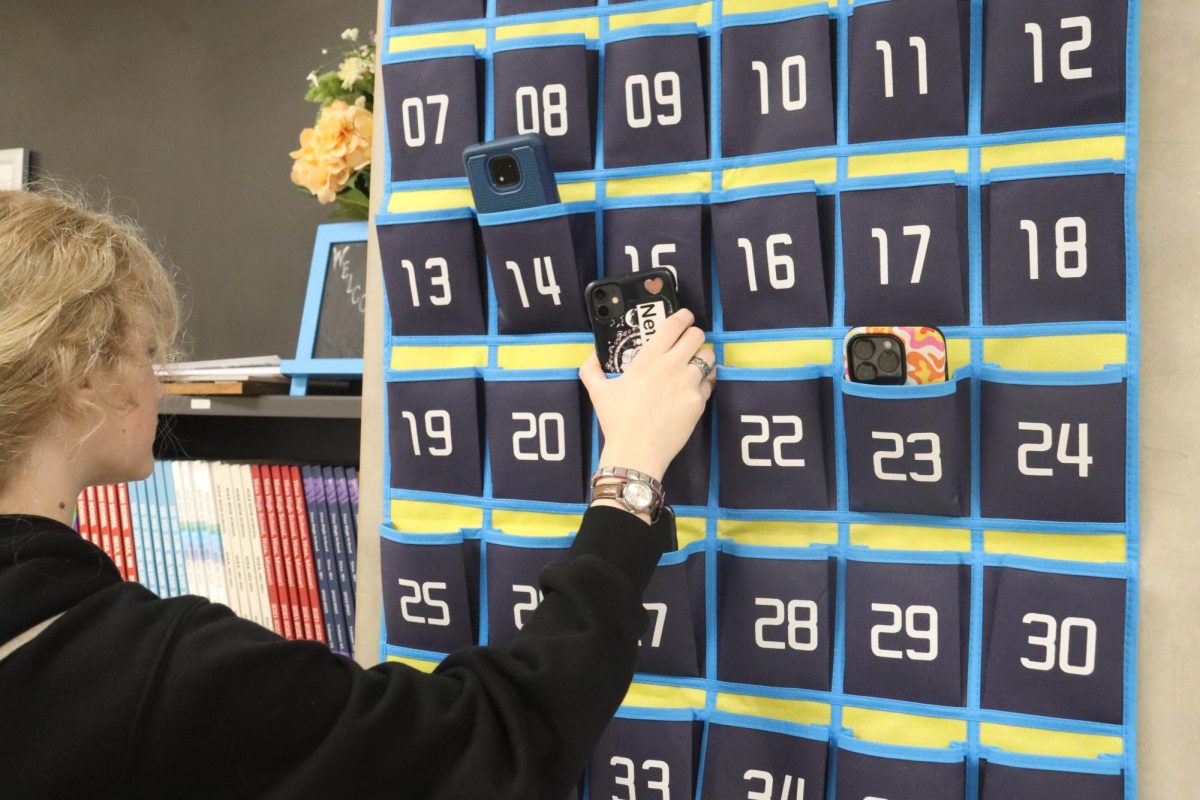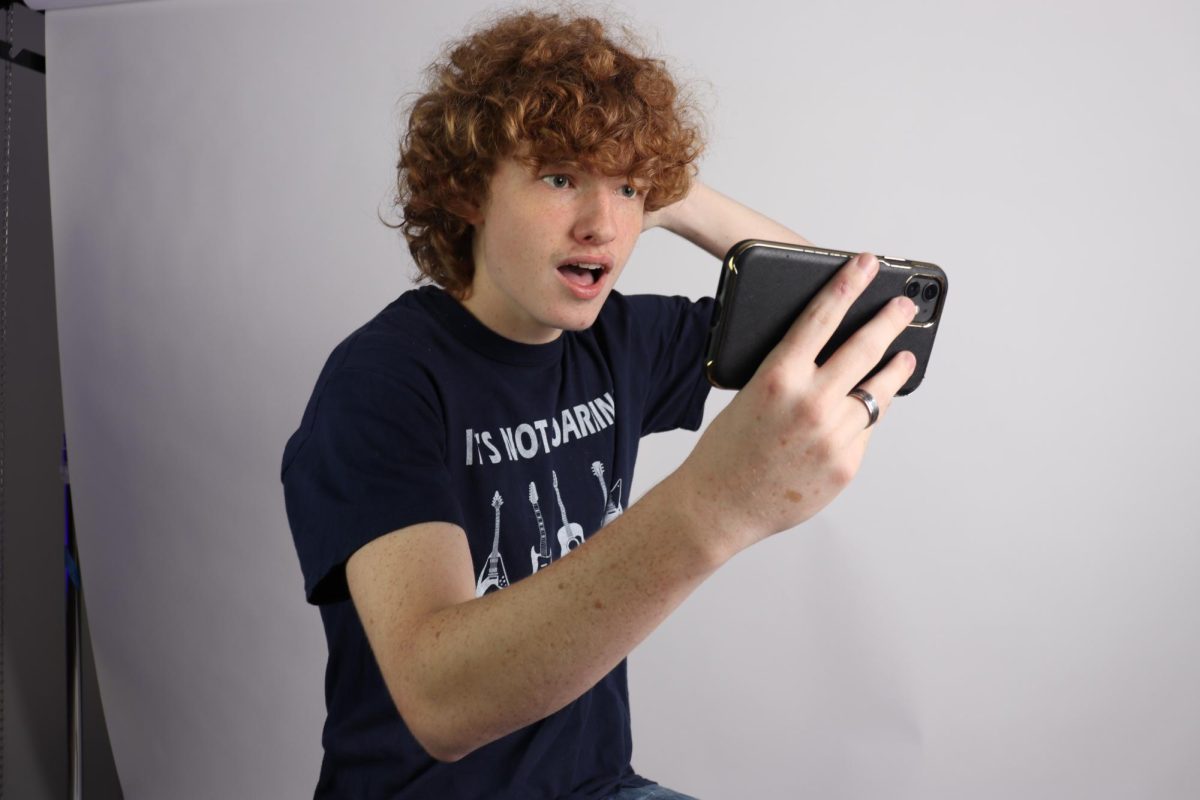Students, put your phone away. As of the summer of 2024, Nixa High School has hopped on the cell phone restriction bandwagon, implementing a new policy in hopes of addressing both educational and practical concerns surrounding personal technology use in school settings.
Dr. David Kelly, principal at NHS, said this new set of rules put into motion differs from the complete ban taking over education systems in other states, yet steers away from the lax attitude shown at NHS previously. These guidelines propose a newly formed middle ground.
“I don’t think our goal is ever to go all out ban on them [phones],” Kelly said. “I know some schools have tried that, but I don’t have a good argument for you not to have it at lunch… The teachers seem very happy with where it’s at, I would say, overall, I think the students understand where we were coming from with it.”
While other school systems around the nation have taken a ‘full ban’ approach, Kelly said he doesn’t see the benefits surrounding the idea, instead, aiming to put into motion a perspective that corresponds in a greater way with the ever-changing technological world of the modern day.
“I do think there’s a balance,” Kelly said. “You’re going to have that device your whole life and you have to learn how to manage [said] device, so I hope part of our policy is also teaching kids that there’s a time and a place for it. When a teacher’s up in the front of the classroom teaching, that’s not the time for it, but when you’re sitting at lunch, that’s an appropriate time. It’s your time, it’s free time.”
Educators have already reported seeing the effects, on both teachers and students, when implementing this new set of rules.
“I do think there’s an increase in student engagement and I think that teachers are noticing that,” Kelly said. “Students are even noticing… The students are more engaged in the content and at the end of the day, that’s what we’ve talked with our teachers about…”
Like most high-action topics, there are two sides to the coin of technology restrictions concerning teenagers. One benefit of the cell phone changes is increased participation and higher focus. But students see negatives, too. Junior Lucy Snook faces some of these downsides.
“I understand that I don’t need to send a Snapchat or a DM (direct-message), but that communication that I have to have is really important,” Snook said. “My dad is health compromised, so if anything happens I need to be able to contact him and my step mom. That’s definitely a downside [of] being detached from them. I think [the cell phone policy], in a way, is good for focus and productivity, but those downsides… I don’t really know if they outweigh the benefits.”
Although the new cell phone policy was ultimately put into motion to benefit students regarding both educational and mental purposes, to some it may feel like more of a penalty than an assistance.
“I feel like it’s doing something, but… it just feels like more of a punishment for the people that are already succeeding,” Snook said. “I definitely think it should be more of a cause and effect policy where if you have no missing assignments and you’re passing all of your classes, then you can have your phone during downtimes whenever lectures are over and you don’t have work to do. However, then if you’re failing classes, you have to put your phone away. I think it should be more flexible and not just a blanket rule for everyone because then it’s kind of unfair to have kids with all A’s have their phones in the pockets whenever kids who are flunking already have to put theirs in there as well. It’s like ‘why am I working so hard if no matter what I can’t have these privileges?’”
While a number of students believe that the current policy should be adjusted to be more of an incentive system, some teachers on the opposite end of the scale beg to differ.
“I think they should be banned in school,” math teacher Michell King said. “… There’s just no need for them in education, they cause more trouble than anything else. [From] kids taking pictures when they’re not supposed to, to cheating, we can’t monitor everything … In my opinion, there’s absolutely no purpose for cell phones in a classroom.”
Despite the array of varying opinions surrounding the subject, the middle ground in this new policy provides a compromise for both sides.
“So if you don’t want your kid to have a phone, then don’t buy your kid a phone,” Kelly said. “If you do, we’re going to have some limitations in place as far as when they can use those here at school. A complete ban would be tough… It does seem like most people agree that they shouldn’t be out in the classroom while a teacher is teaching.”
Silent Mode
Nixa High School puts a new cell phone policy into motion
Kadence Darrah, Copy Editor
October 9, 2024
“At the start of every class period, students will silence their cell phones and place them in a designated area where they will remain until the end of class, including STAR,” 2024-2025 Nixa High School Student/Family Handbook said.
0
Tags:
More to Discover
About the Contributor

Glennis Woosley, Editor-In-Chief
Senior Glennis Woosley has been editor-in-chief of Wingspan magazine for two years. Over the summer, she went to three summer programs: The School of the New York Times, Missouri Girls State and Medill Northwestern Journalism Institute. Aside from journalism, Glennis competes in speech and debate, where she is the Co-Chair for Nixa’s speech and debate team, FBLA and DECA. She also enjoys playing the bass guitar and following U.S. politics.
















